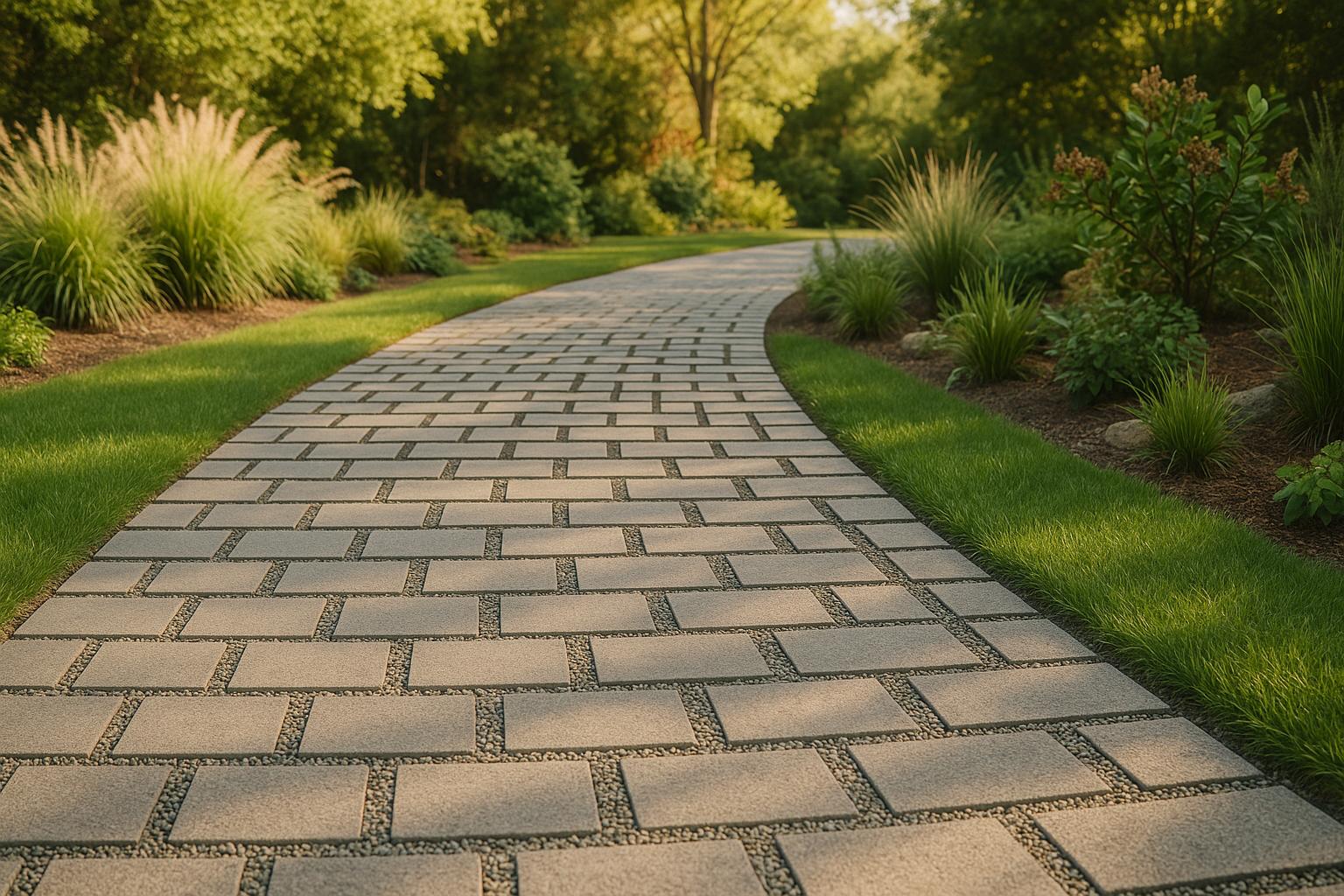- bhavya gada
- No Comments
When choosing a driveway, consider options that manage rainwater effectively and reduce runoff. In Maryland, where heavy storms and freeze-thaw cycles are common, permeable pavers, gravel driveways, and grass pavers are practical solutions. Here’s a quick breakdown:
- Permeable Pavers: Durable, low maintenance, and handle heavy vehicles. They reduce stormwater runoff by up to 90%. Costs range from $10–$30/sq ft.
- Gravel Driveways: Affordable and fully permeable. Prone to ruts and requires regular upkeep. Costs range from $1–$3/sq ft.
- Grass Pavers: Green and natural look, with moderate durability. Requires consistent lawn care. Costs range from $8–$15/sq ft.
Quick Comparison:
| Option | Permeability | Durability | Maintenance | Cost |
|---|---|---|---|---|
| Permeable Pavers | High (90%) | Long-lasting (20–30 yrs) | Low | $10–$30/sq ft |
| Gravel Driveways | Full (100%) | Moderate (prone to ruts) | High | $1–$3/sq ft |
| Grass Pavers | High (90%) | Moderate (turf wear) | High (lawn care) | $8–$15/sq ft |
Each option balances cost, durability, and water management differently. Choose based on your needs, budget, and local climate.
Permeable Driveway Installation: Step-by-Step Guide for Eco-Friendly Solutions 🌱🚗 #driveway #pavers
1. Permeable Pavers
Permeable pavers are a top choice for eco-friendly driveways, delivering both functionality and environmental benefits. These systems use modular, porous materials like concrete or stone that allow water to flow through the surface and into the ground beneath [2].
Permeability
The design of permeable pavers provides outstanding water management. With wide joints filled with aggregate and a deep, gravel-only base, these systems allow water to drain efficiently [7]. High-quality installations can handle several inches of rainfall per hour, ensuring effective drainage even during heavy storms [7]. This feature prevents stormwater from overwhelming local drains, as nearly all rainwater is absorbed into the ground [2]. The result is a system that not only manages water effectively but also supports long-term durability and requires minimal upkeep.
Durability
When it comes to longevity, permeable pavers stand out. A properly installed system can last 20–30 years [9]. Their modular design allows for slight flexibility, making them resistant to cracking during Maryland’s freeze–thaw cycles [6]. Premium options, with compressive strengths exceeding 8,000 psi, can easily handle the demands of heavy vehicle traffic [4]. Additionally, the deep, well-drained base prevents water from pooling and freezing beneath the surface, reducing the risk of frost heaving. Pro Landscapes MD uses high-quality materials like Techo-Bloc, Allen Block, and El Dorado Stone to ensure both durability and aesthetic appeal in their driveway installations across central Maryland. These features make permeable pavers a reliable and visually pleasing option for Maryland homeowners.
Maintenance
One of the biggest advantages of permeable pavers is their low maintenance. Occasional sweeping, replenishing the joint aggregate, and periodic inspections are all that’s needed to keep them in great shape [6]. Unlike gravel driveways, which often require regular raking, permeable pavers maintain a stable and easy-to-manage surface. If a paver gets damaged, it can be replaced individually without disrupting the entire driveway, making repairs straightforward and cost-effective [9].
Environmental Impact
Permeable pavers also shine when it comes to their environmental benefits. As rainwater seeps through, the system naturally filters out pollutants, improving groundwater quality [2]. This filtration process helps protect nearby waterways from runoff that could carry oil, chemicals, or debris. Additionally, permeable paver installations can contribute to LEED certification for sustainable building projects, support natural water cycles, and help homeowners comply with local stormwater management regulations [2].
Cost
The cost of installing permeable pavers in the U.S. typically ranges from $10 to $30 per square foot [2]. While the upfront investment may be higher, the long-term benefits often outweigh the initial expense. Thanks to their durability and low maintenance, homeowners can save on lifecycle costs. Plus, potential reductions in stormwater fees and compliance with local regulations add to the overall value [8]. In Maryland, many homeowners find that the combination of durability, environmental perks, and aesthetic appeal makes the higher initial cost well worth it.
| Performance Factor | Rating | Key Benefit |
|---|---|---|
| Permeability | Excellent | Handles several inches of rainfall per hour |
| Durability | High | 20–30 year lifespan with minimal maintenance |
| Environmental Impact | Very Positive | 90% reduction in stormwater runoff |
| Cost-Effectiveness | Good | Higher upfront cost, lower long-term expenses |
2. Gravel Driveways
Gravel driveways are an affordable and environmentally friendly option, featuring natural stone aggregate that creates a permeable surface. This design allows rainwater to seep into the ground, offering effective water management.
Permeability
Gravel driveways offer 100% permeability, as rainwater flows directly through the gaps between stones into the soil [4]. This natural drainage reduces runoff, lowers the risk of flooding, and helps replenish groundwater. Unlike solid surfaces that redirect water, gravel absorbs rainfall on-site, easing the burden on local stormwater systems. This efficient water management also contributes to the longevity of gravel surfaces.
Durability
While gravel driveways handle freeze-thaw cycles well due to their flexibility, they can be prone to ruts and erosion, especially in areas with heavy traffic or sloped terrain [4]. Over time, the loose stones may shift, leading to uneven surfaces. However, compared to rigid paved surfaces, gravel is less likely to suffer from frost heave damage [3].
Maintenance
Gravel driveways require periodic upkeep. Regular raking can smooth out ruts and redistribute displaced stones, while additional gravel may be needed after storms or heavy use [3][4]. To reduce maintenance, installing weed barrier fabric and stabilization grids during construction can help prevent weed growth and keep the gravel in place [1]. Modern stabilization grids, with cell depths of around 2 inches, are particularly effective for passenger vehicles, improving durability and reducing the need for frequent repairs [1][4].
Environmental Impact
Gravel driveways positively impact the environment by promoting water infiltration, reducing runoff, and supporting groundwater recharge [3][4]. However, the extraction, transportation, and sourcing of gravel do contribute to a carbon footprint. Additionally, loose gravel can create dust and sediment runoff if not properly managed [1][4]. Using stabilization grids and other thoughtful installation techniques can help minimize these drawbacks while maintaining the environmental benefits.
Cost
Gravel driveways are highly economical, with installation costs typically ranging from $1 to $3 per square foot [3]. While the initial cost is low, ongoing maintenance – such as refilling gravel and leveling the surface – should be factored in [3][4]. Adding stabilization grids during installation may increase upfront costs but can significantly reduce long-term maintenance expenses. Overall, gravel driveways remain a budget-friendly choice, though maintenance is an ongoing consideration.
| Performance Factor | Rating | Key Characteristic |
|---|---|---|
| Permeability | Excellent | 100% permeable surface |
| Durability | Moderate | May develop ruts without stabilization |
| Environmental Impact | Positive | Supports groundwater recharge |
| Cost-Effectiveness | Excellent | $1–$3 per square foot installation |
sbb-itb-843f8be
3. Grass Pavers
Grass pavers combine the strength of hardscape materials with the natural beauty of grass, creating a durable yet green solution for eco-friendly driveways. These grid systems, made from plastic or concrete, are filled with soil and grass to form a permeable surface capable of supporting light vehicles [1]. Let’s break down their key features, from water management to cost.
Permeability
Grass pavers excel at managing water runoff. With up to 90% natural infiltration, they can reduce runoff by 50–100% compared to traditional impervious surfaces. This not only helps recharge groundwater but also plays a vital role in supporting local water systems and reducing stormwater issues [1].
Durability
The strength of grass pavers depends on the quality of materials, proper installation, and regular upkeep. High-strength grids can handle loads up to 5,000 psi, making them suitable for passenger vehicles and light trucks. However, they are not as tough as concrete or stone pavers. Under heavy or frequent use, the grass surface may wear down, leading to muddy patches, especially if the turf is not well-maintained [1].
Maintenance
Keeping grass pavers in good shape involves regular lawn care – mowing, watering, and fertilizing are essential to maintain healthy turf. Unlike gravel driveways, which need raking and refilling, grass pavers require soil aeration to keep the grass thriving. In areas with hot, dry summers, irrigation becomes crucial to prevent the grass from drying out [1].
Environmental Impact
Grass pavers deliver more than just water management benefits. By maintaining a green surface, they help cool the surrounding area, reducing the urban heat island effect. They also filter pollutants from stormwater, improving water quality. Additionally, these systems support local biodiversity by creating habitats for insects and small wildlife. Many grass pavers are made with recycled materials, further boosting their eco-friendly profile [1].
Cost
The initial installation of grass pavers typically costs between $8 and $15 per square foot. This price depends on factors like material choice, site preparation, and labor rates in your area. While ongoing lawn maintenance can add to the expenses, these costs are often lower than those associated with more specialized hardscape systems [1].
| Performance Factor | Rating | Key Characteristic |
|---|---|---|
| Permeability | Excellent | Up to 90% infiltration rate |
| Durability | Moderate | Susceptible to turf wear under heavy use |
| Environmental Impact | Excellent | Cooling effect and habitat support |
| Cost-Effectiveness | Good | $8–$15 per square foot installation |
For homeowners in Maryland and Washington, DC, Pro Landscapes MD provides expert installation and maintenance services. They ensure your grass paver system is perfectly suited to the local climate, helping you get the most out of this sustainable driveway option [1].
Pros and Cons
This section highlights the main strengths and challenges of eco-friendly driveway options, offering a clear comparison to help you make the best choice for your needs.
When deciding on an eco-friendly driveway, each option brings its own set of benefits and limitations. Weighing these factors carefully can guide homeowners toward a solution that aligns with their budget, preferences, and long-term plans.
Permeable pavers stand out for their durability and visual appeal, though they come with a higher upfront cost. These systems can cut stormwater runoff by up to 90% compared to traditional driveways and are strong enough to handle heavy vehicles without cracking [5]. Their interlocking design ensures excellent strength, with maintenance limited to occasional sweeping and rinsing. However, installation costs range from $10 to $30 per square foot, making them the priciest option at the start [3].
Gravel driveways are a more affordable choice, with installation costs between $1 and $3 per square foot [3]. They offer great permeability and a natural aesthetic. However, they require consistent upkeep, including raking, refilling, and weed control, to prevent rutting and erosion. Without proper stabilization, gravel can shift over time, leading to uneven surfaces.
Grass pavers fall in the mid-range for cost, with installation priced at $8 to $15 per square foot. However, they demand regular lawn care, including mowing, watering, and fertilizing [4]. While they blend seamlessly with natural surroundings, they’re less suitable for heavy traffic and can develop muddy or patchy areas without proper maintenance.
To make these differences easier to grasp, here’s a side-by-side comparison:
| Criteria | Permeable Pavers | Gravel Driveways | Grass Pavers |
|---|---|---|---|
| Durability | Excellent – supports heavy vehicles and resists cracking | Moderate – prone to rutting and erosion | Low-Moderate – can be damaged by frequent traffic |
| Maintenance | Low – occasional cleaning and joint re-sanding | High – regular raking, weed control, and refilling | High – mowing, watering, fertilizing, and aeration |
| Drainage | Excellent – up to 90% runoff reduction | Excellent – fully permeable but may erode without stabilization | Excellent – supports natural infiltration |
| Aesthetics | High – variety of colors and patterns | Moderate – rustic, natural look | Natural – green appearance that blends with the landscape |
| Installation Cost | High – $10 to $30 per sq ft | Low – $1 to $3 per sq ft | Moderate – $8 to $15 per sq ft |
Climate also plays a big role in how these options perform. Permeable pavers handle freeze-thaw cycles well and are easy to clear of snow. Gravel driveways hold up reasonably well in cold weather but can be tricky to plow. Grass pavers, on the other hand, may struggle in areas prone to drought or heavy shade.
For homeowners in Maryland and nearby regions, Pro Landscapes MD offers expert installation of permeable paver driveways. Their sustainable hardscaping solutions balance drainage needs with aesthetic goals, ensuring long-lasting results that suit central Maryland’s diverse climate.
These insights provide a solid foundation for evaluating the best option for your eco-friendly driveway project.
Conclusion
Selecting the best eco-friendly driveway for your property comes down to balancing your priorities and budget.
Permeable pavers are a durable, low-maintenance option that excels in drainage. While the initial cost is higher – ranging from $10 to $30 per square foot – their ability to reduce stormwater runoff and support heavy vehicle loads makes them a great choice for many homeowners seeking long-term value.
For those looking for a more affordable solution, gravel driveways offer a cost-effective alternative, with installation costs between $1 and $3 per square foot. They provide a natural, rustic look that works well in rural settings but do require regular upkeep to address gravel displacement and rutting.
If aesthetics and a greener touch are your focus, grass pavers provide an appealing option for light vehicle use. They blend beautifully with natural landscapes but will need consistent lawn care to stay in top shape.
Pro Landscapes MD specializes in sustainable paver driveway solutions that comply with local stormwater regulations and deliver lasting results.
FAQs
What makes permeable pavers an environmentally friendly choice for driveways?
Permeable pavers offer a smart, environmentally conscious option for driveways. Their design allows water to seep through the surface, cutting down on runoff and helping to recharge groundwater supplies. Plus, this natural filtration process helps lower the risk of flooding and keeps pollutants from washing into nearby waterways.
Unlike traditional materials like concrete or asphalt, permeable pavers excel at managing stormwater while also absorbing less heat. This makes them a practical choice for anyone looking to create outdoor spaces that are not only functional but also better for the environment.
What should I consider when deciding between permeable pavers, gravel, or grass pavers for my driveway?
When deciding on the best option for your driveway, it’s important to weigh factors like durability, maintenance needs, appearance, and how it impacts the environment. For instance, permeable pavers are a smart pick if you’re looking for an eco-friendly solution. These pavers let water seep through, cutting down on runoff and helping to replenish groundwater. Plus, they’re built to last and come in a variety of styles to match your home’s design.
If you’re working with a tighter budget, gravel driveways might be worth considering. They’re affordable and offer great drainage. However, they do require regular upkeep to address issues like shifting stones or weed growth. For a more natural and green vibe, grass pavers offer a unique blend of functionality and aesthetics. They can handle light vehicle traffic while showcasing lush greenery, but they’ll need consistent care to keep the grass thriving.
The right choice for your driveway will ultimately come down to your priorities – whether that’s cost, ease of maintenance, or creating a specific look for your outdoor space.
What are some maintenance tips for keeping permeable pavers effective in areas with freeze-thaw cycles, like Maryland?
To ensure permeable pavers stay effective and last longer in areas with freeze-thaw cycles, like Maryland, consistent maintenance is key. Here’s how you can keep them in great shape:
- Keep the surface clear: Remove debris, leaves, and dirt regularly to prevent the joints and drainage system from getting clogged.
- Check and refill joints: Over time, gravel or other joint materials may settle or wash away. Refill these areas as needed to maintain proper drainage.
- Skip harsh deicers: Opt for sand or eco-friendly ice melt instead of traditional salt-based deicers, which can harm both the pavers and the surrounding environment.
- Fix damage quickly: Address cracks or uneven surfaces as soon as possible to prevent water from pooling or freezing, which can lead to further damage.
A little regular care goes a long way in keeping your permeable pavers functional and ready to handle tough weather.


















Chat with Us